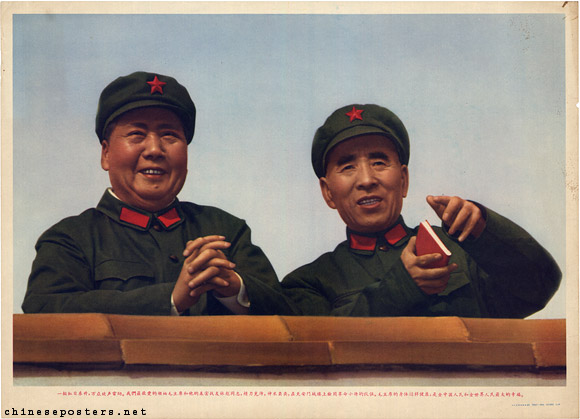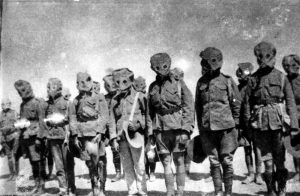Most of the time we are told stories filled with mystery, and these stories usually have a conclusion. However, some stories are filled with mystery and their conclusions are yet another mystery. This is exactly what happened with the story of Lin Biao’s death. Lin Biao was Chairman Mao Zedong’s Vice-Chairman, who was a Chinese political leader and distinguished man who achieved glory for being one of the most honorable men in China, after fighting in many battles, such as the Chinese Civil War in the 1930s and 1940s, as well as in the Cultural Revolution of the 1960s. Lin Biao deeply believed in Mao’s communist movement and was supportive of his political ideals completely. Yet, on September 13, 1971, the plane in which Lin Biao was aboard, mysteriously crashed after supposedly running out of fuel while flying over Mongolia. The Chinese reported that no person aboard the Trident 1-E aircraft had survived.1
One word from Chairman Mao is worth ten thousand from others. His every statement is truth. We must carry out those that we understand as well as those we don’t. – Lin Biao2

Lin Biao, originally named Lin Yurong, was born in Huanggang, Hubei province, China on December 15, 1907. Growing up, he was deeply affected by the differences between social classes and cultural upheavals within China. As a teenager, he became interested in the socialist and communist movement in China, and in 1923, he joined the Socialist Youth League. Lin rapidly became a well-known name in China, after being pivotal to the victory of the Chinese Civil War (1927-1950).3 But the Chinese Civil War was just the beginning of his support of the leader of the Chinese Communist Party, Chairman Mao. Years later, during the Cultural Revolution (1966-1976), he led the youthful group named Red Guards, a group known to spread Mao’s communist propaganda and cult beliefs, but unfortunately Lin Biao had died years before this came to an end. Even though, until the very last days, Lin had always supported Mao completely, becoming known as “Mao’s best student” and “closest comrade-in-arms.”4 This devotion towards Mao and his movement eventually led him to be officially named and recognized as “Mao’s heir” within the Communist Party.5 And by this point, Lin Biao had become the second most powerful man in China, second only to Mao himself.6
The mystery in Lin Biao’s death lies in the fact that, while Mao’s government accused Lin Biao of being a traitor, a report from Soviet officials who inspected the wreckage of the downed aircraft (because it had crashed on the Soviet Union’s border), reported that no body over the age of fifty was found.7 This suggested that Lin Biao had never been aboard that plane to begin with. But then, what had happened to Lin Biao? Had he been killed days before the airplane crashed? Furthermore, if there was no body found, then what explains his disappearance? Actually, it is said that Mao invited Lin Biao and his wife to a dinner at his house after finding out of his betrayal, planning to execute him. Lin Biao eventually discovered his plan while having dinner, so he fled Mao’s home. Lin Biao couldn’t manage to get away too far. In no time, his grand limousine, known as the ‘Red Flag,’ was soon being chased by Mao’s elite Security Unit 8431. Instantly, the Security Unit caught up to Lin Biao, shooting down and destroying the limousine after an altercation, in which both Lin and his wife died at the scene. Of course, this version was never revealed to the Chinese people.8

The story of Lin Biao is so mysterious because even until April 1, 1969 during the Cultural Revolution, when he was the leader of the People’s Liberation Army, Lin Biao effectively led the party. And by 1971 he was already rumored to have planned a coup leading to this death in the same year. Some historians believe that the only reason why Lin Biao disappeared was because Mao became too wary of the power Lin Biao had–but nothing has been proved nor found. 9 Furthermore, it is believed that Lin Biao had a similar fear but he feared that Mao would replace him with somebody else, instead of him being the one who would eventually inherit Mao’s position. Hence, Lin speedily planned Mao’s assassination and a coup d’etat to assume power. In spite of their many years of close comradeship, several political differences came between them. While Lin Biao preferred having an army administrating the country, Mao preferred and wanted to rebuild the Communist Party as a new power base. Therefore, by the early 1970’s, the two had drifted apart.10 Many conspiracy theories behind Lin Biao’s “Project 571” began to emerge. One theory was that Lin was not acting alone, but in collusion with his family, specifically his son Lin Liguo, who was one of the masterminds in planning the coup to establish a new government in Guangzhou, China.11 The plan was drafted and planned under the code “Project 571” as a play on words, which, if read in Chinese, is pronounced “wu gi yi” and when spoken means “armed uprising.” The project had everything coded, and Mao was mentioned under the code name “B-52.” The plan was to exploit Mao’s tour of South China and to execute him aboard his private train. However, Mao returned to Beijing safely and the plan was never carried out.12 Soon after Mao discovered their plan, Lin Biao and his family boarded a plane and attempted to flee China. Mysteriously, the airplane crashed on September 13, 1971 while flying over Mongolia, where everyone aboard died, including Lin Biao, or so it was reported by Mao’s government. But again, the Soviet’s report, upon inspecting the crash, stated otherwise.13

Thus, Lin Biao’s death continues to be vague and ambiguous. Decades after his death, the puzzle pieces are scattered, and the missing pieces continue to hinder knowing the full story of Lin Biao and whether he really did plan to assassinate or overthrow Mao. Perhaps it was solely a plan of his son Lin Luguo. But how did Lin Biao really died? Was the conspiracy of the “Project 571” real? How is it that a man who had followed Mao for so long had drafted a plan to assassinate the one person to whom Lin Biao himself had supported and fought for all his life? Due to Chinese influence and story cover-up, as well as Mao’s control in the government, no further evidence to answer so many questions can be found…and we’ll probably never know. One thing remains in history, is how the story of Lin Biao remains a tale of glory, mystery, and death.

- Orville Schell, “A Chinese Puzzle Missing Some Pieces,” The New York Times, May, 15 1983. Accessed February 21, 2019. https://www.nytimes.com/1983/05/15/books/a-chinese-puzzle-missing-some-pieces.html. ↵
- BrainyQuote, s.v. “Lin Biao”. ↵
- Encyclopedia Britannica, s.v. “Lin Biao Chinese Military Leader” by Edward J.M. Rhoads. ↵
- Encyclopedia of Modern China, 2009, s.v. “Lin Biao 1907–1971,” by David Pong. ↵
- Encyclopedia of Modern China, 2009, s.v. “Lin Biao 1907–1971,” by David Pong. ↵
- Orville Schell, “A Chinese Puzzle Missing Some Pieces,” The New York Times, May, 15 1983. Accessed February 21,2019.https://www.nytimes.com/1983/05/15/books/a-chinese-puzzle-missing-some-pieces.html. ↵
- Orville Schell, “A Chinese Puzzle Missing Some Pieces,” The New York Times, May, 15 1983. Accessed February 21, 2019. https://www.nytimes.com/1983/05/15/books/a-chinese-puzzle-missing-some-pieces.html. ↵
- Orville Schell, “A Chinese Puzzle Missing Some Pieces,” The New York Times, May, 15 1983. Accessed February 21, 2019. https://www.nytimes.com/1983/05/15/books/a-chinese-puzzle-missing-some-pieces.html. ↵
- “Lin Biao” New World Encyclopedia, July 23, 2018. http://www.newworldencyclopedia.org/entry/Lin_Biao#Attempted_coup_and_downfall ↵
- Orville Schell, “A Chinese Puzzle Missing Some Pieces,” The New York Times, May, 15 1983. Accessed February 21,2019.https://www.nytimes.com/1983/05/15/books/a-chinese-puzzle-missing-some-pieces.html. ↵
- Encyclopedia of Modern China, 2009, s.v. “Lin Biao 1907–1971,” by David Pong. ↵
- Orville Schell, “A Chinese Puzzle Missing Some Pieces,” The New York Times, May, 15 1983. Accessed February 21,2019.https://www.nytimes.com/1983/05/15/books/a-chinese-puzzle-missing-some-pieces.html. ↵
- Orville Schell, “A Chinese Puzzle Missing Some Pieces,” The New York Times, May, 15 1983. Accessed February 21, 2019.https://www.nytimes.com/1983/05/15/books/a-chinese-puzzle-missing-some-pieces.html. ↵



33 comments
Aaron Sandoval
This article was very interesting, and the author did a good job detailing the relationship between Mao Zedong and Lin Biao, as well as the many mysteries that surround the death of Lin Biao. I know very little about the relationship between Mao Zedong and Lin Biao, in reality, I didn’t know who Lin Biao was, this article does a good job of briefly outlining his importance. I also really enjoyed how the author concluded the article with questions that may never be answered.
Alexander Avina
This was a very interesting take on this story. I wasn’t very familiar with it, but it was a very interesting to read. I enjoyed the speculation and the backstory. I really enjoyed how you truly bought into the conspiracy and explained it to such an elaborate extent. The article kept me interested the whole time. I hope that more information is revealed in the future.
Sabrina Doyon
I don’t really understand this article very much. Why would Lin Biao rebel against Mao when he was the one who Mao wanted to continue his reign? I guess I don’t understand why he would throw away the life he had because of a silly suspicion. I think it is sneaky that the people of China were never really given a straight answer to what happened to Lin Biao.
Analisa Cervantes
While I do not have much knowledge on the Chinese political history, I do find myself interested in this article. I have heard of Mao and Communist China but this is the first time I ever heard of Lin Biao. I find it interesting to read just how close of a relationship he had with Mao. I am intrigued as to what happened to Lin Biao.
Samantha Bonillas
Lion Bao was a foreign story to me, as well as the history of China. Murder mysteries and anything dealing with crime and putting pieces together are topics that I find intriguing. Although that there might not be any evidence that links Mao to the death of Lion Bao, I still believe that he was the one responsible. In my opinion, Mao’s motive that drove him to kill Bao, or be responsible for his disappearance was because Bao wanted to kill him first. Overall, this was a nice read.
Kenneth Gilley
What an interesting article! I had not heard the story of Lin Biao’s death before. If Biao really was planning a conspiracy against Mao, then it wouldn’t be surprising at all if Mao had him assassinated. Such an act would not be out of the ordinary for Mao, given that he killed an estimated 42.5 million people during his rule. We may never know what actually befell Lin Biao.
Alejandro Herrera
This provides new insight into Lin Bao’s death. There is the benefit of the doubt that Lin Bao could have been assassinated before he got on the plane, as you mention, by the elite squad of Chairman Mao. It could be made the case that Mao wanted to kill him because Lin Bao wanted to kill him first, so there is a motive of why would Mao want to kill his most trusted man. Further investigation into this is needed, of course, perhaps this would open the door to further inquiries about the death of Lin Bao.
Diego Terrazas
I have little knowledge of political history of China but this was an interesting article to read yet not really surprised why his death remained a mystery. It is most probable the Chinese government covered up the story. As you stated, the world will never know the truth and all we can really do is speculate. It is peculiar that China stated he died in a plane crash but the Soviets stated otherwise, again which is not really surprising.
Victoria Salazar
Great article! The word “conspiracy” alone is what pulled me in. I always find it tragic when one’s body is never recovered. This story reminds me a lot of Amelia Earhart in that she too went missing when flying a plane over an ocean. Although, her story did not have the alternate theories of being purposely assassinated. I don’t think that I will every truly understand why governments feel the need to cover these things up instead of handling matters properly. It makes me wonder what other conspiracies are out there.
Auroara-Juhl Nikkels
I had never heard of Lin Biao before reading your article, but my knowledge of China, especially it’s history is limited. You did an awesome job describing the life of someone who had such a mysterious death. Mysteries are some of my favorite genes to read, and your article was awesome! I wonder if he really even died in the same time frame of the crash or if he was able to hide his identity and move/ live elsewhere.?